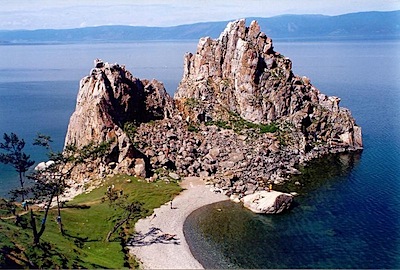Lake Baikal
Best. Lake. Ever. Lake Baikal, in southern Siberia in Russia, contains over 20% of the world's fresh water and is home to over 1700 species of plants and animals, of which two thirds are found nowhere else. Although less than half the surface area of Lake Superior, it's over a mile deep, comprised of an ancient rift valley where the Earth's crust is pulling apart at two centimeters per year. As the rift has expanded over the millenia, it has filled in with a layer of sediment that is now four miles deep.
Due to its extreme age (25-30 million years) and isolation from other bodies of water, Lake Baikal has developed many unique species that are unlike any found elsewhere, and is therefore often called the "Galapagos of Russia". The lake is home to a species of freshwater seal, as well as the translucent Baikal oil fish, known for liquefying into a slurry of oil and bones when dredged up from the extreme pressures at the depths of the lake.
